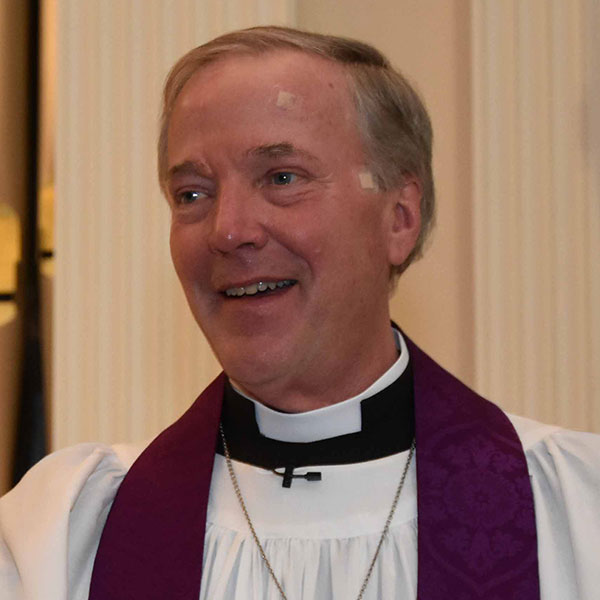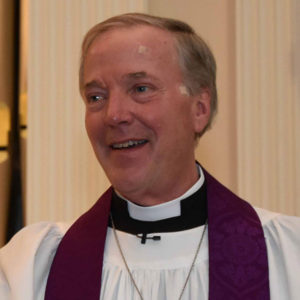FROM THE RECTOR – June 11, 2020

To the community of Saint Paul’s,

My first semester at Virginia Theological Seminary I took a theology course. The professor Marianne Micks, “Mixy”, was my nemesis. Every paper written for her class came back with every male pronoun used of God circled in red. It was an ongoing battle, but through the process I grew. Nowhere near perfect, but I grew. I grew to see the world through different eyes; not simply my own limited and highly parochial view of God and the world God created (notice I didn’t use “he”).
Fast forward three years. I was needing to create a course for independent study and find a professor to help guide the process. My choice of topic: William Temple, Archbishop of Canterbury from 1942 until his death in 1944. Something drew me to Temple and I wanted to know more. And something drew me to “Mixy” and the expanding of my understanding of God, the Church and the World.
Temple was progressive and forward thinking but respected within the conservative realms of the Church of England and beyond. Temple was admired for his scholarly writing, his inspirational teaching and preaching, for his constant concern for those in need or under persecution, and for his willingness to stand up on their behalf to governments at home and abroad. Short quotes I would read by Temple drew me even deeper.
“Religion is what you do with your solitude.”
“It is a great mistake to think that God is chiefly concerned with our being religious.”
“Little things are little things; but faithfulness in little things is a very great thing.”
“The most influential of all educational factors is the conversation in a child’s home.”
There is a point here, I promise. We always live in times that call us to look at things around us with fresh eyes and clear vision, with a restlessness that draws us to something better. It is this openness that brings about needed change in our lives and in the world that surrounds us.
These past weeks have caused many in our community, in our nation and in our world to be drawn to something better. The racial disparity in our systems, in our culture, is real and so many of the little things we fail to notice help keep it in place. For me and for others, one such little thing is the Leonidas Polk memorial. Living through the last several weeks I have been forced to realize that there are seen and unseen stumbling blocks for people of color that sustain a narrative of inequality. I believe that if Saint Paul’s is truly going to be the gathering place, the place of prayer and witness for our community, that we must remove things that get in the way.
We are changing the front of the Church building so that those with mobility issues can enter Saint Paul’s without stumbling. We are redesigning and building new handicapped accessible restrooms so that people who come to be a part of this community will not find an obstacle.
In that same vein, the monument to a Confederate general, albeit bishop, who owned hundreds of slaves and sought to expand the plantation culture (meaning a need for slaves) throughout the southwest, is a stumbling block to not only people of color, people from other cultures and people just like you and me. It does not send the message of inclusion and welcome we say is a part of who we are as Saint Paul’s Church.
We are a people of symbols. Some years ago the baptismal font was moved from a place near the eagle lectern to its present location. This move happened to symbolize centrality of baptism in our common life, it is the place we enter. The altar was pulled from the wall to symbolize the gathering of God’s people around God’s table. Again a powerful symbol.
This is the sort of thing that will never gain the understanding and support of all. There are strong feelings for keeping things where they are and how they are. After all, we are Episcopalians and we don’t like change, we value our traditions. As we move into our future it is my hope that we can be faithful witnesses to our Lord Jesus who says “Come to me, ALL who labor and are heavy laden, and I will give you rest.” Yes, our history is important, but our sacred space needs to speak to the eternal truth of welcome and refreshment through the power of Jesus.
William Temple once said, “The Church exists primarily for the sake of those who are still outside it.” Dietrich Bonhoeffer in his Letters and Papers from Prison wrote, “The Church is the Church only when it exists for others…not dominating, but helping and serving. It must tell men of every calling what it means to live for Christ, to exist for others.”
I believe we are called to focus on those outside our doors. We are called, at this time and in this place, called to exist for others “…not dominating, but helping…” to do our little thing to be who we are called to be.
Finally I would like to quote one of our Vestry persons, Bill Ford. Bill in a recent email said to me, “ Making these changes says more about our faith than those symbols say about our history.”
Let us pray.
O God of unchangeable power and eternal light: Look favorably on your whole Church, that wonderful and sacred mystery; by the effectual working of your providence, carry out in tranquility the plan of salvation; let the whole world see and know that things which were cast down are being raised up, and things which had grown old are being made new, and that all things are being brought to their perfection by him through whom all things were made, your Son Jesus Christ our Lord; who lives and reigns with you, in the unity of the Holy Spirit, one God, for ever and ever. Amen.



